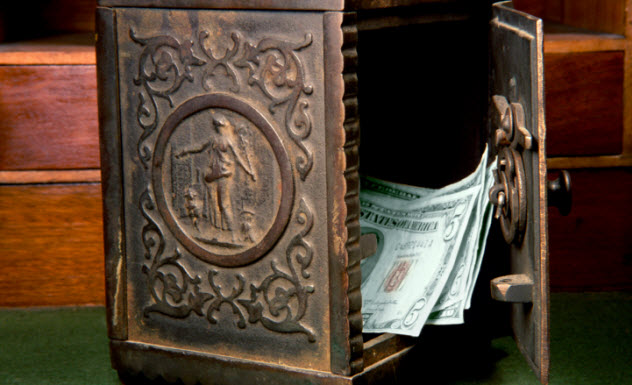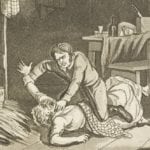 History
History  History
History  Food
Food 10 Weird Foods Inspired by Your Favorite Movies
 Religion
Religion 10 Mind-Blowing Claims and Messages Hidden in the Bible Code
 Facts
Facts 10 Things You Never Knew about the History of Gambling
 Weird Stuff
Weird Stuff 10 Cool and Creepy Facts about Collecting Tears
 Humans
Humans The Ten Most Lethal Gunslingers of the Old West
 Misconceptions
Misconceptions 10 Phony Myths and Urban Legends That Just Won’t Die
 History
History 10 Amazing Roman Epitaphs
 Weird Stuff
Weird Stuff 10 Niche Subcultures That Are More Popular Than You Might Think
 Mysteries
Mysteries 10 Tragic Disappearances and Deaths in Joshua Tree National Park
 History
History Top 10 Tragic Facts about England’s 9 Days Queen
 Food
Food 10 Weird Foods Inspired by Your Favorite Movies
 Religion
Religion 10 Mind-Blowing Claims and Messages Hidden in the Bible Code
Who's Behind Listverse?

Jamie Frater
Head Editor
Jamie founded Listverse due to an insatiable desire to share fascinating, obscure, and bizarre facts. He has been a guest speaker on numerous national radio and television stations and is a five time published author.
More About Us Facts
Facts 10 Things You Never Knew about the History of Gambling
 Weird Stuff
Weird Stuff 10 Cool and Creepy Facts about Collecting Tears
 Humans
Humans The Ten Most Lethal Gunslingers of the Old West
 Misconceptions
Misconceptions 10 Phony Myths and Urban Legends That Just Won’t Die
 History
History 10 Amazing Roman Epitaphs
 Weird Stuff
Weird Stuff 10 Niche Subcultures That Are More Popular Than You Might Think
 Mysteries
Mysteries 10 Tragic Disappearances and Deaths in Joshua Tree National Park
10 Century-Old Headlines For Outrageous Poker Stories
A century ago, people trusted newspapers to bring them information and entertainment. At the time, poker was “America’s favorite pastime,” and its devotees often made the papers. But if you thought that poker was a game reserved for the wealthy or the criminal element, get ready to reevaluate that assumption. These 10 headlines only hint at stories that sound like they’ve been ripped from the subplot of a Hollywood movie.
10 ‘Wife A Poker Jinx, So Spouse Asks Divorce’

In 1910, this straightforward headline from The San Francisco Call was the actual reason that one woman gave a judge for needing a divorce. Mrs. Alma Olsen was a religious woman who refused to stop praying, despite claims by her husband that her prayers “hoodooed” his luck and caused him to be unable to support his family. In a surprise twist, Mrs. Olsen chose to admit that she was a poker jinx, with the hope that the judge would let her out of her insufferable marriage.
In the newspaper account, little is made of her testimony that “[her husband] became more violent against her” as his poker losses continued. He had even forced her and their child to seek shelter with a neighbor on at least one occasion. The newspaper relayed Mrs. Olsen’s testimony that her husband was “a carpenter, earning $5 a day, but most of this he lost at the poker table.”
Nevertheless, in a day and age when it wasn’t easy to leave your spouse, Judge Graham granted Mrs. Olsen a divorce. Apparently, he agreed that she deserved a more suitable companion with whom to maintain her family or would simply be better off by herself. Then again, perhaps the judge was merely a religious man who wouldn’t tell anyone to stop praying, especially if it might benefit a gambling man.
9 ‘Eggs Being Used For Poker Stake’

The decade was called “the Roaring Twenties,” but according to this article in the Powder River County Examiner, pennies were a rare commodity around Billings, Montana, in 1921. The article says that the men of the town were adamant that their poker game couldn’t die, no matter how broke they were. At that time, they needed this diversion more than ever.
So the men banded together to come up with a plan. The man who suggested the “egg ante” was labeled a genius because eggs appeared to be the most common commodity in town at the time. Even the article’s subtitle, “Farmers Of The Billings District Discover New Use For Hen Fruit,” implies availability by using a pet name for eggs. According to the reporter, “All of the members arose and called him blessed. The games went on.”
Townsfolk were already accustomed to trading eggs for other kitchen staples, like flour and sugar, which made value easy to establish. The article went on to say, “Nightly the farmers gathered with the eggs gathered for the day, and first one farmer and then the other would drive to town and ‘cash in’ on his night’s work.”
Poker became the pit stop on the way to payday, rather than the other way around. Fortunately, there is no mention of anyone resorting to betting with live hens or scrambling an opponent’s “chip stack.”
8 ‘How Some New York Women Pay Their Poker Debts’

The reporter that penned this story for The Evening World’s Home Magazine in 1903 was attempting an expose. In the first paragraph, he hinted at the salacious truth about New York women: “As a smoker of cigarettes, a devotee of the cherry-trimmed cocktail, she has come in for her share of the reformers’ criticism; but there are a few facts concerning her gaming propensities that have heretofore never been disclosed, and which show the grim determination to ‘stay in the game‘ that possesses the feminine mind.”
Then he revealed that New York women who ran out of money during poker games sent their bellboys, janitors, or other emissaries to the pawn shop with any valuables the women had on hand. Diamond rings were some of the less expensive items pawned, worth approximately $75 each. Bracelets, broaches, and necklaces were often worth thousands of dollars more.
When the reporter visited the pawn shop to see the goods, he heard about a woman who had pawned her wedding ring in an attempt to recoup her losses, only to be blackmailed by her messenger the next morning. He retrieved the ring and threatened to tell her husband unless he was properly compensated for his silence. Unfortunately, the woman also failed to make a comeback at the poker table.
In another anecdote, a widow tried to laugh off her $75 poker loss, saying that she thought they were all just having fun, and became ostracized from high society. According to the article:
She did not really consider the game in anything but the light of amusement, but her sister players were enraged, and as a result the loser was ostracized from the poker-playing set entirely, and her name has been stricken from the calling list of a large number of women who heard of her action and considered her in the same light men do a card sharp. Of course, the money could not be legally collected from her, so no public action was taken. Only infinite scorn followed her.
7 ‘Lost His Clothes In Poker Game’

Deep into the spring semester at Yale in 1904, a poker game took place that was so shocking, the story traveled across the country and landed in The Bisbee Daily Review in Bisbee, Arizona. After a policeman stopped a young man in pajamas dashing across York Street to Pierson Hall, the officer demanded an explanation for the indecency upon threat of arrest. The poor freshman told the policeman that he and some classmates had wanted to play poker but had nothing with which to back their chips. Then one of the young men suggested that they play for their clothing.
According to the article, “It was decided to set a price upon each piece of clothing worn by the various youths and use them by removal as needed in the game and depositing the same in the chair of the winner. It was agreed that if one lost his clothing he must seek his abiding place in his night attire only, to be loaned by the man who occupied the room, the clothes to be returned to the owner [the] next day.”
This “freshie,” whose name was kindly omitted from print, went broke around midnight and was turned out into the cold near a theater rife with passersby. According to the social customs of the time, the young man was practically naked. But there is no mention of even a scolding from the policeman. The article does say that the freshman told him, “For excitement, it’s the greatest poker game I ever sat into.” The reporter concluded with a prediction that was right on the money: “It is thought the fad is likely to spread.”
6 ‘Raised The Limit With A Cop’

On April 23, 1906, this headline from the New York paper, The Sun, may explain why female poker players weren’t welcome in many backroom games. The article tells the story of Irene Lockman, “a tall, angular woman about 50 years old,” who started the evening with astounding luck at the poker table, peaking at around $200 in winnings just after midnight. Shortly thereafter, her luck began to change.
At the same time, Mr. Ferguson and Mr. Arachtinzi began winning as often as Mrs. Lockman had earlier in the evening. Marie Vergnoiles, the game’s hostess, told the reporter, “She had good hands, all the time good hands, but the others had always better ones. When she got three aces and a pair of queens one of the men had four deuces. If she had a king high flush it would be beaten by an ace high one.”
Fed up with her change of luck, Mrs. Lockman eventually asked to be excused for a moment. Marie Vergnoiles said, “The Americans are so modest I thought she wished to go outside to get at her pocketbook—but she went for the gendarme.” Mrs. Lockman had dashed across the street to find a policeman and ended up getting them all pinched (including herself).
The women made bail, but the men were locked up on charges of robbing Mrs. Lockman, in addition to the offense they’d all committed of being common gamblers. Days later, all four received a second punishment when their names and addresses appeared in print below this headline.
5 ‘Click Of Poker Chips Echoes In Jury Room’

This headline in the Daily East Oregonian about a trial in Tombstone, Arizona, was likely as shocking to US citizens in 1920 as it would be if run today. The laws of the time forbade even penny ante poker in the privacy of your own home, but the cowboys stuck on that Tombstone jury didn’t care. They wanted an outlet for their frustrations and weren’t going to take “no” for an answer. The bailiff protested, but the cowboys finally found a loophole with which he couldn’t argue.
According to the rules of the court, the sheriff was not allowed in the jurors’ room during deliberations, and he was the man who would have to arrest them for their crimes. If he wasn’t allowed inside, how could he arrest them? How could he know for certain who was guilty? Furthermore, why would he want to delay the current trial by arresting the jurors for indulging in America’s favorite pastime?
Apparently, the cowboys got away with it. The article concludes by saying, “Now the click of the poker chip is the familiar sound on the second floor of Tombstone’s courthouse. Thus far there’s been no dissenting opinion.”
4 ‘Kept It In The Family’

If you believe that women haven’t been proving their skills on the felt just as long as men have, this story from the December 8, 1897, edition of The Roanoke Times should convince you. According to an admiring fellow townsman, a businessman identified only as Tom had lost a good chunk of his riches to his wife (aka “Mrs. Tom”). She had grown tired of sitting silent while her husband lost their money night after night playing poker. So she came up with a clever solution.
Mrs. Tom asked her husband to gamble with her. The Roanoke Times quotes the admirer as reporting that, “Tom thought his wife was delirious with anxiety, but the plan was so novel and was so insinuatingly put that he couldn’t reject it. . . . The little woman was not a loser [of even] a dollar from the very first night they started play.”
It wasn’t long before Tom became so obsessed with beating his wife at two-handed draw poker that he quit his other poker games. He also admitted that it had no longer become a question of who would win, but how much she would take him for on the nights that they played.
Unfortunately for Tom, his increased devotion wasn’t enough. At the end of six months, sometime around the end of 1897, Mrs. Tom supposedly had $200,000 of her husband’s securities stashed in her portion of the safe deposit vault. That’s the equivalent of around $6 million today! Of course, teaching your spouse that kind of lesson has always been priceless.
3 ‘Girl Is Stake At Poker’

In his autobiography, The Godfather of Poker, Doyle Brunson states repeatedly that many of the fights he witnessed at poker games were caused by a woman. However, he doesn’t mention any games quite like the one reported in the December 26, 1913, edition of the Daily East Oregonian, which was years before his time.
The game took place in Rollette, North Dakota. It seems that two brothers had their eye on the same girl and decided to settle their battle for her affections with a game of poker. James Belknap won and immediately made arrangements to marry Miss Jessie Peltier. (The paper published her name but said nothing about her background, her looks, or even her awareness that she was the stake in a poker match.) Then, for some unknown reason, James left town, likely feeling that his future was safe and secure.
Unfortunately, James was in for a surprise. When he returned, his fiancee was nowhere to be found. Although he tried not to jump to conclusions, James eventually investigated and learned that his prize had run off to Canada to marry his brother George (aka “the loser”) while James had been away. Somehow, the paper still managed to make Peltier sound like the crazy one. The subtitle read: “Young Woman Elopes With Suitor Who Loses Her in Card Game.”
2 ‘Poker Wonder Had Double-Jointed Eyes’

It’s hard to tell if the dialogue published below this headline in The Salt Lake Herald on August 9, 1909, was intended as pure fiction or a folktale that the locals believed to be true. In the story, a Mr. Greenhut, whose background went unmentioned, recounted the tale of a legislator named Pelleas Pillikins who was elected merely because he was over 2 meters (7 ft) tall and double-jointed all over. Greenhut explained that Pillikins was not overly successful as a legislator but impressed his constituents nonetheless. However, most of them did not know that his greatest talent was “reading” people at the poker table.
Greenhut watched Pillikins battle Sam Fuller at the felt. According to Greenhut, Fuller was “the most enthusiastic poker player in Arkansas them times.” Afterward, as Greenhut praised Pillikins for his victory and his extraordinary talent, Greenhut received a quite humble explanation: “Then Pelleas Pillikins he ‘xplained it, or p’tended to, sayin’ he sort o’ sensed it some way an’ most gen’ly reckoned right, but he couldn’t tell how he done it. An’ anyways, he says, he wouldn’t play f’r nothin’ but fun, bein’ as he didn’t like to take money offen nobody ‘thouten ’twas a p’fessional, an’ them he hadn’t no use for.”
At first, Greenhut accepted this explanation for why Pillikins had never lost a hand of draw poker. Then one day, he and a few friends (who had also witnessed the game) met a stranger who knew Pillikins. The stranger asked if Pillikins had played poker and laughed when he was told “yes.” He laughed again when told that Pillikins hadn’t lost one bit.
Although Greenhut and his friends knew that Pillikins was double-jointed all over, they were still surprised by the stranger’s revelation about Pillikins: “Well, just nachully Pelleas Pillikins, bein’ double j’inted all over, was double j’inted in his eyes, too. He c’d just see all over the room an’ round the corner into the next room if he tried. Just nachully he c’d see what everybody helt ag’in him an’ he never played ‘thouten he had the best cards.”
1 ‘Used Cats As Chips’

A cat fight unlike any other caused this headline to run in The Herald And News of Newberry, South Carolina, on Christmas Day in 1903. The source was a correspondent for The New York Sun, who had somehow gathered intimate knowledge of the strangest poker game ever played—a duel between Pete Snelling (aka the “Cat Hermit”) and “Old Man” Booker of Clarkson.
The article states that “[the] game grew out of professional jealousy, each of the players pretending to be the boss hermit in point of years, hard luck and number of cats.” You read that right. Two men wanted to be known as the biggest “cat lady” around and used poker to determine the winner.
Used as “chips,” the cats and kittens were shuffled between rooms, crates, and boxes throughout the game. Each player had a box to corral his chips, and there was one box for the pot. A kitten was worth half as much as a grown cat.
Snelling began the game with approximately 50 cats and 20 kittens. There was no mention of how many chips Booker had at the start. However, at one point, things got a bit wild, and Booker had to request “ten hours to hustle in for more cats.” He returned with 20 cats and six kittens in less than six hours. They raised the limits and resumed the “cat-poker championship of western New York.”
In the end, Snelling won the championship and well over 100 cats and kittens.
Rachel Hoyt is a freelance writer, poker player, scooter salesperson, and artisan candlemaker based in Santa Barbara, California. She has been blogging for more than five years in rhyme and is currently working on her first children’s book and first novel. Follow @Rachel_Hoyt_SB on Twitter to keep apprised of Rachel’s latest publications.








